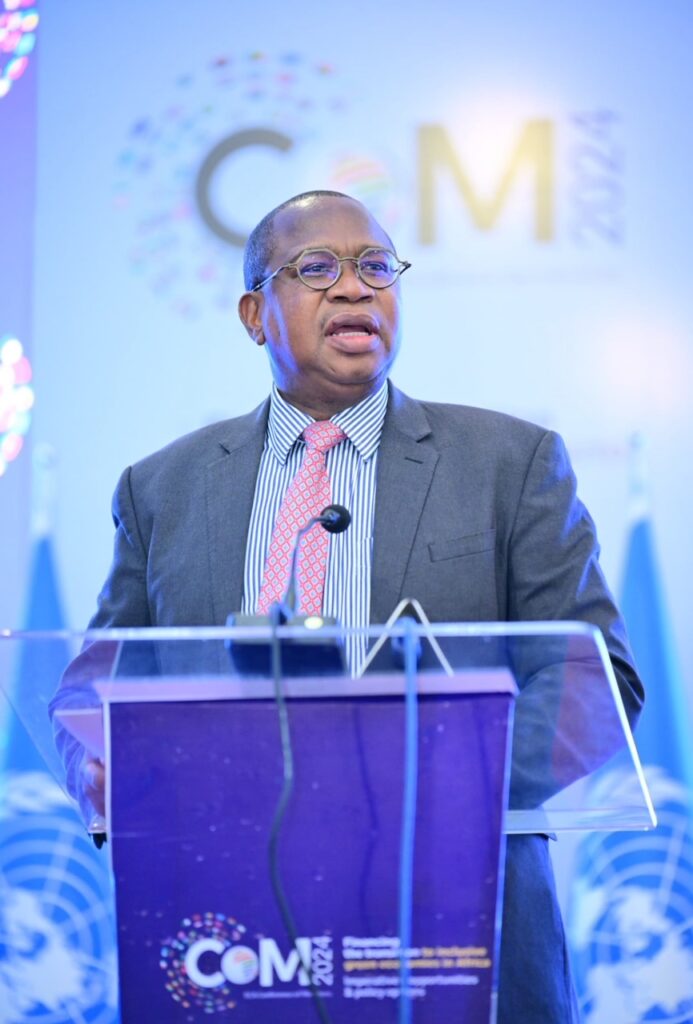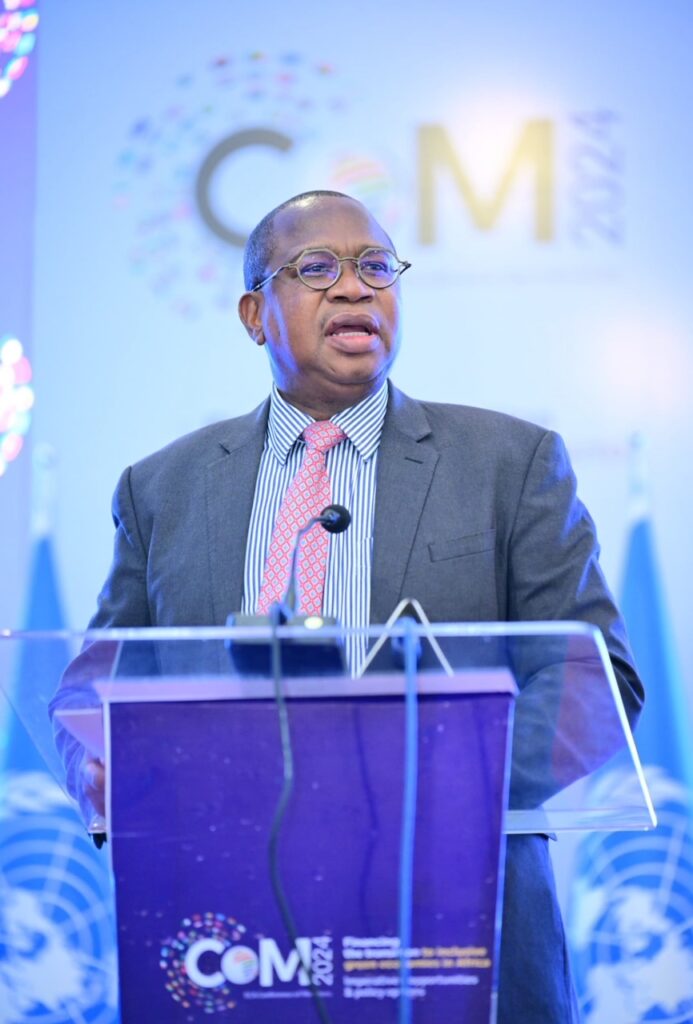Op Ed by Professor Mthuli Ncube, Zimbabwe Minister of Finance
- The African continent is central to global efforts to combat climate change.
- The continent’s geography — from forests to sweeping coastlines — positions it as a potential major player in renewables and carbon abatement.
- To develop these industries and aid the fight against climate change, green finance is key.
Climate change disproportionately impacts low-emitting countries, including those in Africa. Despite contributing minimally to global emissions, Africa faces severe climate events that outstrip its capacity to adapt.
To bolster climate action, the international community has committed to providing finance, technology and capacity-building support to developing nations as outlined in the United Nations Framework Convention on Climate Change (UNFCCC).
The debate between phase-out and phase-down of fossil fuels highlights the Global South’s call for a just transition to renewable energy, recognizing historical disparities and the need for support.
Effectively funding the climate transition in African countries would not just help in the global effort against climate change, but provide a major boost to develop the continent’s vast nature- and renewable-based potential.
Africa’s vast solar and wind energy potential offers a path to reduced emissions and economic development. Additionally, the continent’s forests play a crucial role in carbon sequestration, potentially generating revenue through carbon trading if challenges like market development and regulation are addressed.
While global climate finance flows have increased — reaching $850-940 billion in 2021 and a booming green bond market — they fall far short of the trillions required annually to meet global climate goals. Developing countries desperately need more funding. Current financing often takes the form of loans, potentially exacerbating debt burdens, and lacks sufficient transparency.
The good news is that this kind of funding will go towards developing Africa’s vast potential across climate projects, particularly in renewable energy generation and carbon sequestration.
Africa’s green opportunity
Evidence shows that Africa has enormous potential for the development of renewable energy sources, particularly solar and wind. The continent is endowed with some of the best solar resources in the world, with parts of North Africa receiving an average of over 2,000 hours of sunshine per year. Africa also has excellent wind resources, particularly along its long coastline.
Developing renewable energy sources in Africa could help to reduce the continent’s reliance on fossil fuels and reduce greenhouse gas emissions, as well as create new opportunities for economic development, job creation and poverty reduction.
Africa’s vasts forests, such as the Congo Basin rainforest, the Guinea-Congo forest, the East African Coastal Forest, the Miombo woodlands and the Sudanian Savanna have a significant role in the global carbon cycle as carbon sinks.
As such, these landscapes have potential to play a major role in carbon trading. But despite this huge potential, the current value of carbon trading in Africa is relatively low, contributing a paltry 2% on the global carbon markets of trading taking place mostly in the voluntary carbon market.
The African continent is estimated to have the potential to reduce emissions by over 2 billion tonnes of carbon dioxide equivalent per year by 2030. By reducing deforestation and forest degradation as well as upscaling sustainable forest management, Africa could generate carbon credits that could be sold on the carbon market.
However, the realization of this potential hinges on a number of factors, including the development of a formal carbon market, enforcement of regulations and the availability of funding as well as the development of renewable energy and other low-carbon technologies.
Green finance: Africa’s path forward
Standing in the way of the continent and its people making the most of this potential are the limited resources available for climate action in Africa. Public sector efforts alone are insufficient. Innovative financing mechanisms must play a major role in attracting private capital. Blended finance, which combines public and private funds, offers a way to de-risk green investments for wider participation.
Climate bonds, targeted at emissions reduction and resilience projects, are expanding globally. Growing investor interest signals the potential to harness this tool for African initiatives. Equity financing, despite perceived risks, provides an avenue for funding renewable energy development and sustainable agriculture.
African governments can further accelerate the green transition by establishing specialized financial institutions such as green banks. Developing functional carbon markets, such as those outlined in the Africa Carbon Markets Initiative (ACMI), would open additional revenue streams for sustainable development projects while supporting Africa’s potential as a net exporter of carbon credits.
To achieve success, public and private sectors must collaborate, mobilizing resources aligned with development needs. Africa requires an estimated $52.7 billion annually for climate action — but investment is vastly under current spending levels. Increased financing offers both climate solutions and a pathway to inclusive economic development.
Green industrialization for a resilient and equitable Africa
By pursuing green industrialization, with a clear focus on sustainable financing, Africa stands to reduce greenhouse gas emissions while transitioning to a more resilient and equitable future.
New industries and jobs created by the shift provide opportunities for economic development and poverty reduction. Access to clean energy and essential services is integral to this process, leading to a more sustainable world for all.
Prof. Mthuli Ncube, Minister of Finance, Economic Development and Investment Promotion , Government of Zimbabwe
Prof. Mthuli Ncube is the Minister of Finance in Zimbabwe. He has a background in academia, banking, investments and public policy.
Ncube is on the Global Agenda Council of the World Economic Forum on “Poverty and Economic Development” and on the Advisory Council for World Economic Forum (WEF) on Sustainable Infrastructure.
Before his appointment as Minister of Finance in Zimbabwe in September 2018, he was managing director and head of Quantum Global Research Lab (Switzerland), part of Quantum Global Group, the largest Private Equity group dedicated to investing in Africa.

From 2014 to 2016 Professor Ncube led a multi-disciplinary project on the Economics of HIV (Rethink HIV) project at the Blavatnik School of Government as Professor of Public Policy.
He joined the Blavatnik School from the African Development Bank Group (AfDB), where he was Chief Economist and Vice President. He is ranked as a top economic thinker on Africa and globally. As Vice President and Chief Economist of the AfDB he led the strategic thinking within the bank on development issues, and directly supervised the development Research, Statistics, and capacity development, general knowledge management, and strategy. He led and guided the development of the Bank’s ’10 term Strategy’ (2013-2022). He championed the “inclusive growth” agenda that underpins the bank’s long-term strategy, and created an “Inclusive Growth Index” for Africa. He represented the AfDB in external engagements and spokesperson on economic/development issues. He has led policy dialogue activities with governments in Africa and globally.
Professor Ncube holds a PhD in Economics (Mathematical Finance) from the University of Cambridge, Selwyn College, UK, on “Pricing Options under Stochastic Volatility”. He has been the Dean of the Faculty of Commerce Law and Management, and also Dean and Professor of Finance at Wits Business School, all at the University of Witwatersrand, in South Africa. He founded the Centre for Entrepreneurship at Wits University. He was also a Lecturer in Finance at the London School of Economics (LSE).
He has extensive experience as an investment banker, having worked at Investec. He was head of Asset Allocation Strategy and Manager of the Investec Global Managed Fund. He founded Barbican Holdings and Selwyn Capital, financial services companies. He was a Board member of the South African Financial Services Board (FSB), and Chairman of the National Small Business Advisory Council. He is Chairman of the Board of AERC and a Board member of the Global Development Network (GDN).
He has published numerous books, papers and articles in the area of economics and political economy and finance. Some of his recent books include: Monetary Policy and the Economy in South Africa (Macmillan 2013); Quantitative Easing and its Impact on US, UK Europe and Japan (2013); Africa’s Middleclass (2014); African Financial Markets and Monetary Policy (2009); and The Oxford Companion of the Economics of South Africa (co-edited, Oxford University Press, 2015).
He is a Commissioner of the Lancet Commission on Investing Health, which is co-chaired by Prof Lawrence Summers, former US secretary to the treasury, and a member of the OECD Expect Group on Rethinking the Future of Development Aid.
He is a regular commentator in media such as the BBC, the Financial Times and The Wall Street Journal.


